
BMC Palliative Care
Scope & Guideline
Pioneering Research for a Meaningful Tomorrow
Introduction
Aims and Scopes
- Patient-Centered Care:
Research focusing on the experiences, preferences, and needs of patients and their families in palliative care settings, emphasizing a holistic approach to care. - Interventions and Therapies:
Studies evaluating various therapeutic interventions, including pharmacological and non-pharmacological approaches, to alleviate symptoms and improve quality of life for patients with advanced illnesses. - Healthcare Professional Perspectives:
Investigations into the attitudes, knowledge, and experiences of healthcare professionals regarding palliative care, including training and education aspects. - Cultural and Ethnic Considerations:
Research examining how cultural and ethnic backgrounds influence perceptions and practices of palliative care, ensuring that care is culturally appropriate and sensitive. - Policy and Systematic Reviews:
Analysis of healthcare policies, frameworks, and systematic reviews aimed at improving palliative care services and accessibility on a systemic level. - Family Caregiver Support:
Studies exploring the challenges and experiences of family caregivers in palliative care, providing insights into their needs and the support required. - End-of-Life Decision Making:
Research into the processes and implications of decision making at the end of life, including advance care planning and ethical considerations.
Trending and Emerging
- Digital Health and Telemedicine:
The integration of digital health technologies and telemedicine in palliative care is becoming increasingly prominent, particularly as a means to enhance communication and care delivery. - Interdisciplinary Approaches:
There is a growing trend towards interdisciplinary collaboration in palliative care, emphasizing the importance of diverse professional inputs in improving patient outcomes. - Cultural Competence in Care:
Research focusing on cultural competence and the adaptation of palliative care practices to meet the diverse needs of various populations is on the rise. - Emphasis on Caregiver Well-Being:
An increasing number of studies are addressing the well-being and support needs of family caregivers, recognizing their critical role in palliative care. - Holistic and Integrative Care Models:
Emerging research is focusing on holistic care models that address the physical, emotional, spiritual, and social needs of patients, moving beyond traditional medical frameworks. - Policy Development and Advocacy:
There is a noticeable increase in studies aimed at influencing policy and advocating for improved palliative care services at systemic and organizational levels. - Ethical Decision-Making:
Research on ethical considerations and frameworks for decision-making in palliative care is gaining importance, particularly in the context of complex clinical scenarios.
Declining or Waning
- Traditional Medical Interventions:
There is a noticeable decrease in studies solely focusing on traditional medical interventions without considering holistic or integrative approaches in palliative care. - Generalized Pain Management:
Research that broadly addresses pain management without specificity to palliative contexts or patient-centered outcomes appears to be less frequent. - Single-Disease Focus:
Papers concentrating exclusively on single diseases are declining as the field moves towards a more integrated approach that considers comorbidities and overall patient well-being. - Static Educational Models:
Research on static or traditional educational models for healthcare professionals is waning, with a shift towards more dynamic, interactive, and interdisciplinary training methods. - Palliative Care in Isolation:
There is a reduction in studies that treat palliative care as an isolated field, with an increasing emphasis on interdisciplinary collaboration and integration with other healthcare services.
Similar Journals

CANCER NURSING
Elevating patient care in oncology nursing since 1978.Cancer Nursing, a peer-reviewed journal published by Lippincott Williams & Wilkins, plays a pivotal role in the field of oncology nursing, providing a vital platform for the dissemination of research that enhances patient care and nursing practices related to cancer. With an impressive impact factor and categorized within the Q2 quartile for both oncology and nursing disciplines, this journal ranks among the top resources in its field, sitting at Rank #5 out of 20 in Nursing Oncology. Since its inception in 1978, the journal has continuously evolved to address critical issues in cancer treatment, patient education, and healthcare delivery, making it essential reading for researchers, practitioners, and students alike. Although it does not currently offer open access, the journal's commitment to advancing knowledge in oncology nursing is reflected in its rigorous selection process and the quality of its published research. As we look towards its upcoming issues in 2024, the journal remains a cornerstone for those dedicated to improving cancer care and the overall quality of life for patients and their families.
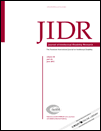
JOURNAL OF INTELLECTUAL DISABILITY RESEARCH
Pioneering innovative insights into intellectual disabilities.JOURNAL OF INTELLECTUAL DISABILITY RESEARCH is a premier scholarly publication that serves as a vital platform for interdisciplinary research in the fields of intellectual disabilities, rehabilitation, neurology, and mental health. Published by Wiley, the journal boasts an impressive reputation, evidenced by its latest Scopus rankings, which place it in the Q1 category in Arts and Humanities (miscellaneous) and Rehabilitation, while also achieving Q2 status in Neurology and Psychiatry. With an enduring history from 1957 to the present, this journal provides open access to groundbreaking studies and insights that drive forward our understanding of intellectual disabilities and their related challenges. The journal’s commitment to publishing high-quality research makes it an indispensable resource for academic researchers, healthcare professionals, and students seeking to contribute to or learn from the contemporary discourse on disability research. Engage with us as we explore the complexities of intellectual disabilities through rigorous, impactful scholarship.
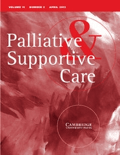
Palliative & Supportive Care
Exploring Innovations in Palliative SupportPalliative & Supportive Care, published by Cambridge University Press, is a pivotal journal dedicated to advancing research and practice in the fields of palliative care, supportive care, and the psychological aspects of terminal and chronic illness. With a robust ISSN of 1478-9515 and an E-ISSN of 1478-9523, this esteemed journal has established itself as a vital resource for professionals, researchers, and students who are committed to improving the quality of life for patients facing serious health challenges. Featuring peer-reviewed articles that span clinical psychology, medicine, nursing, and psychiatry, it holds a respectable impact factor, ranking Q2 in Clinical Psychology, Medicine, and Nursing as per the 2023 category quartiles. The journal is based in the United Kingdom and has been contributing to the field since its inception in 2003. Although it currently does not offer Open Access, its rigorously curated content underscores its relevance and importance in facilitating interdisciplinary dialogue and innovation in palliative and supportive care. For those seeking to stay at the forefront of research, Palliative & Supportive Care remains an indispensable platform for scholarly communication and discovery.

Gaceta Mexicana de Oncologia
Advancing Cancer Research, One Article at a Time.Gaceta Mexicana de Oncologia, published by the SOC MEXICANA ONCOLOGIA, A C, is a prominent Open Access journal that has contributed significantly to the field of oncology since its inception in 2002. With an ISSN of 1665-9201, this journal is dedicated to disseminating high-quality research pertaining to cancer studies, making it an essential resource for researchers, healthcare professionals, and students alike. Operating out of Spain, it serves as a platform for sharing innovative findings and clinical advancements in oncology. The journal's impact in the research community is reflected in its current rankings, placing it in the Q4 category for Cancer Research and Oncology fields. Despite its emerging status within the academic tiers, Gaceta Mexicana de Oncologia aims to enhance its presence in the scholarly domain, especially during its converged years from 2009 to 2024. The accessibility of its articles empowers a wider audience, fostering collaboration and knowledge-sharing necessary for combating cancer in diverse populations.
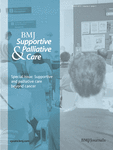
BMJ Supportive & Palliative Care
Empowering healthcare with innovative insights.BMJ Supportive & Palliative Care is a leading academic journal dedicated to advancing the field of supportive and palliative care, published by the esteemed BMJ PUBLISHING GROUP in the United Kingdom. With an ISSN of 2045-435X and an E-ISSN of 2045-4368, this journal showcases high-quality, peer-reviewed articles that cater to a diverse audience, including healthcare professionals, researchers, and students. Notably, it holds a commendable impact factor, reflecting its credibility and influence within the academic community. As of 2023, the journal ranks in the top quartile (Q1) for Medical and Surgical Nursing and holds prestigious positions in the Q2 category for Medicine (miscellaneous) and Oncology (nursing), demonstrating its significance in multiple disciplines. Research published in this journal aims to enhance patient-centered care practices and improve health outcomes, making it an invaluable resource for innovative studies and discussions in the field. With a commitment to open access principles, BMJ Supportive & Palliative Care serves as a pivotal platform for disseminating knowledge and supporting the ongoing professional development of its readership.

Professional Case Management
Navigating the complexities of healthcare with expert case management.Professional Case Management, an esteemed journal published by Lippincott Williams & Wilkins, serves as a vital resource for researchers, practitioners, and students in the multifaceted fields of nursing and healthcare management. With an ISSN of 1932-8087 and an E-ISSN of 1932-8095, this journal has been at the forefront of disseminating significant findings since its inception in 2007. It covers essential topics including Assessment and Diagnosis, Care Planning, Health Policy, and Leadership and Management, holding a respectable position in the Q3 category quartiles of these areas in 2023. Although not open access, the journal boasts a dedicated readership and provides a platform for contemporary research and innovative practices, evidenced by its competitive Scopus rankings. With objectives aimed at advancing the field and enhancing professional case management practice, Professional Case Management is an indispensable tool for those committed to improving patient outcomes and shaping healthcare policies in the United States and beyond.
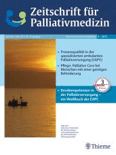
Zeitschrift fur Palliativmedizin
Exploring the frontiers of palliative care with cutting-edge research.Zeitschrift für Palliativmedizin, published by GEORG THIEME VERLAG KG, is a leading journal dedicated to the field of palliative medicine. With its focus on improving the quality of life for patients with severe illnesses, this journal serves as an essential platform for researchers, healthcare professionals, and students interested in the latest developments, practices, and innovations in palliative care. While it does not currently offer open access options, Zeitschrift für Palliativmedizin is committed to disseminating high-quality, peer-reviewed research that advances the understanding and implementation of palliative care strategies. Situated in Stuttgart, Germany, this journal aims to bridge the gap between clinical practice and research, facilitating the exchange of knowledge that enhances patient care and support. As the field continues to grow in importance, this journal stands out as an invaluable resource for those dedicated to improving patient outcomes and advancing the discourse in palliative medicine.

Chiropractic & Manual Therapies
Championing the Future of Physical Therapy and Wellness.Chiropractic & Manual Therapies is a premier open-access journal published by BMC, dedicated to advancing the fields of Chiropractic, Complementary and Alternative Medicine, and Physical Therapy. Since its inception in 2011, the journal has established its reputation within the academic community, evidenced by its Q1 ranking in Chiropractics and Complementary and Alternative Medicine, and Q2 in Physical Therapy, Sports Therapy, and Rehabilitation as of 2023. With an impressive Scopus ranking placing it in the top 5% for Chiropractics and maintaining a strong presence in the complementary medicine sector, Chiropractic & Manual Therapies serves as a critical platform for researchers, practitioners, and students seeking to disseminate innovative findings and practical advancements in manual therapies. Located in the United Kingdom, the journal not only promotes accessible research but also contributes to the ongoing discourse in healthcare practices, ensuring valuable insights are shared widely among professionals and the academic community.
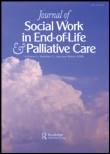
Journal of Social Work in End-of-Life & Palliative Care
Fostering Understanding and Excellence in Palliative SupportThe Journal of Social Work in End-of-Life & Palliative Care, published by ROUTLEDGE JOURNALS, TAYLOR & FRANCIS LTD, serves as a crucial platform for discourse and research in the vital field of end-of-life and palliative care. With its ISSN 1552-4256 and E-ISSN 1552-4264, this esteemed journal, established in 2005, focuses on the interdisciplinary aspects of social work, healthcare, and the accompanying challenges faced in providing compassionate care during critical life stages. As evidenced by its recent 2023 quartile rankings, it holds a prominent position within Q2 in Health (Social Science) and Q3 in both Life-span and Life-course Studies and Social Work, indicating its growing impact within the academic community. The journal is indexed in Scopus, holding a rank of #169/371 in Social Sciences - Health (Social Science), underscoring its relevance and contribution to the field. This journal offers no Open Access options, yet provides valuable insights essential for researchers, practitioners, and policymakers aiming to enhance care standards and foster understanding around end-of-life issues. As it continues to chart its path until 2024, it remains dedicated to advancing knowledge and improving practices in palliative care, making it a vital resource for anyone invested in the well-being of individuals during their final life stages.
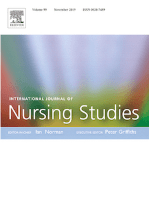
INTERNATIONAL JOURNAL OF NURSING STUDIES
Elevating healthcare through innovative nursing studies.INTERNATIONAL JOURNAL OF NURSING STUDIES, published by PERGAMON-ELSEVIER SCIENCE LTD, stands as a leading journal in the field of nursing, holding a remarkable impact in the academic community with its prestigious Q1 ranking in Nursing (miscellaneous) and a commendable position in the 99th percentile of General Nursing according to Scopus rankings. Since its inception in 1963, the journal has consistently aimed to foster the dissemination of significant research, innovative practices, and comprehensive reviews relevant to nursing and healthcare disciplines. With a commitment to high-quality, peer-reviewed content, it serves as an invaluable resource for researchers, healthcare professionals, and students alike, seeking to advance knowledge and improve patient care outcomes. While it is not an open-access journal, the impactful research published within its pages is vital for the development of nursing science globally, making it a cornerstone of current nursing scholarship.